Mataupu
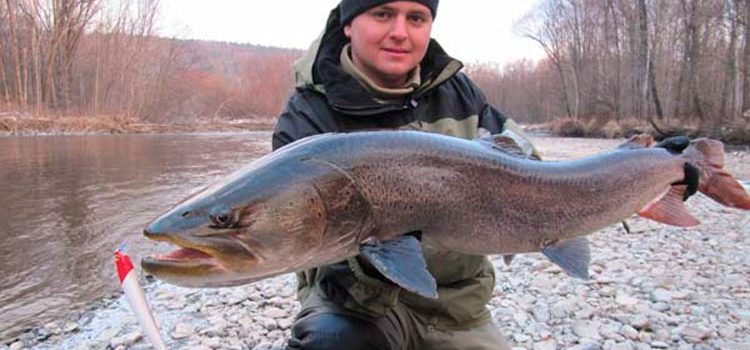
Despite the fact that Vladivostok does not pamper its residents with warmth throughout the year, but is characterized by a sufficient amount of precipitation, there are always a lot of tourists in the city. Most of the visitors are amateur fishermen, which indicates acceptable fishing conditions created by nature itself. The fact is that in this region there is a lot of various fish, including those species that you will not find in other regions.
In addition to amateur fishermen, there are a sufficient number of tourists and just vacationers who have arrived in these parts to admire nature.
This article will tell you how fishing in the vicinity of Vladivostok differs today from fishing in other regions.
Manuia nofoaga fagota
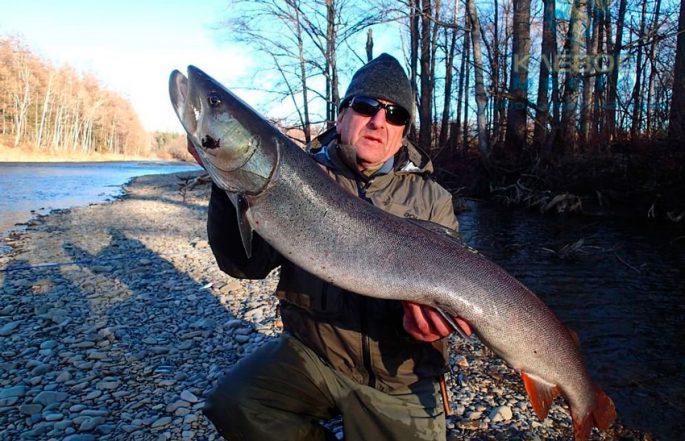
You can also go fishing within the city, but the ecological situation does not predispose to this, but outside the city everything is completely different: here the water is clean, the air is clean, as well as wonderful nature, which is considered the main factors that interest vacationers and fish lovers. fishing.
There is a sufficient number of both wild places and paid reservoirs, where all conditions for fishing and recreation are created.
Fishing Vladivostok, flounder, crab, greenling Fishing, flounder, crab, rasp Nikolay Baryshev
Suhodol River
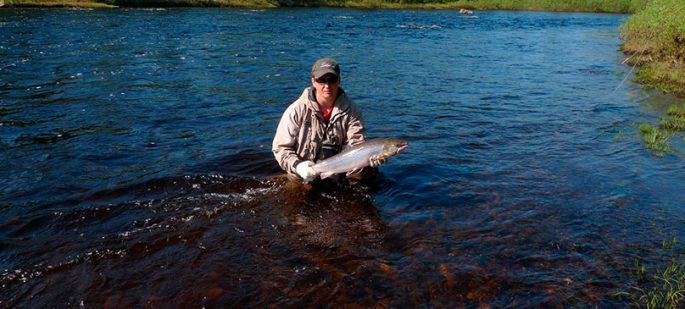
This water artery crosses the southern coastal borders. It is considered the most common corner of wildlife, where beginners prefer to fish. There are huge populations of rudd in the river. With the arrival of winter, when the river is covered with a thick layer of ice, here you can see a huge number of anglers. The length of the river is about 50 km. Along its banks there are settlements such as Romanovka, Rechitsa, Anisimovka and a number of other, smaller ones.
The river goes to the very bay of the Sea of Japan. On the way of its movement, you can meet a couple of smaller rivers that flow into Sukhodol. These are the Gamayunova and Lovaga rivers. It is in the mouths of these rivers that the majority of winter fishing enthusiasts gather, since almost the entire mass of fish is concentrated here, especially in winter.
Ussuri Bay
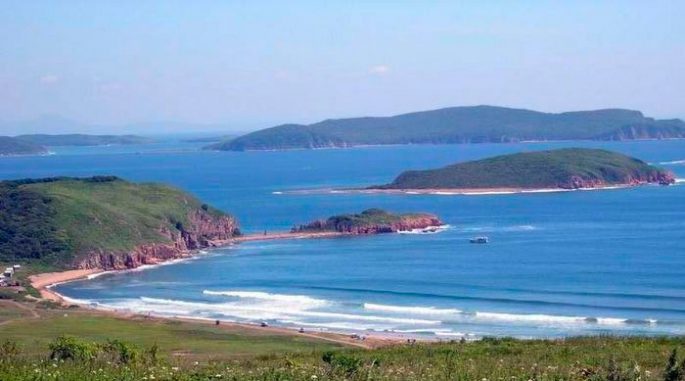
Another great place for fishing, where many types of fish are found, including herring, which is in abundance here. In addition to fishing, here you can usefully relax, as the places are of particular beauty.
From December to March, the shores of the bay, especially on the north side, are covered with ice, which attracts a huge number of winter fishing enthusiasts. Unfortunately, one must be especially careful here, since the thickness of the ice is not the same everywhere.
Sedanka River
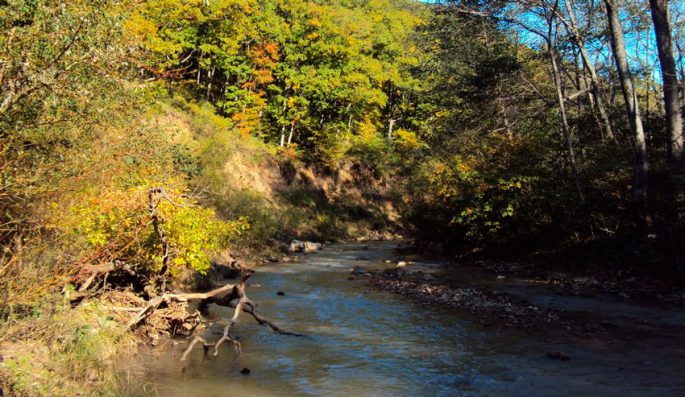
This water artery is located not far from Vladivostok, and you can get to it by commuter trains. This is a great option for those who do not want or are not able to go anywhere else. There is also a sanatorium here, which makes it possible for a real comfortable rest. In this regard, there are always a lot of people here who are eager to relax and fish.
The Sedanka River is home to fish such as trout, chum salmon, minnow, goby, etc., which additionally attracts fishermen. When going fishing, you should get a license to catch salmon species of fish, as many salmon species are protected by law here.
Russian river
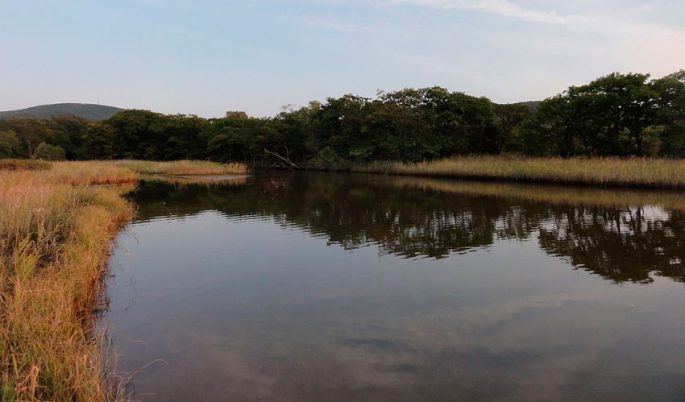
It is considered one of the small rivers of Primorye, which belongs to a special island variety of rivers, flowing through the island of the same name. Some anglers visit this island of the same name in winter to fish, although the service is paid here. In fact, it is much cheaper here than in other places, which attracts fishermen. In addition, there is an abundance of various fish.
A fishing farm is located here, which is able to offer its guests the following services: car parking, various types of recreation and sports games for other family members who are not engaged in fishing. Several houses were built here, designed for 14 people. The base is located on the coast of the Golden Horn, which is on the opposite side of Vladivostok.
For accommodation during the day, each person will have to pay from 500 to 800 rubles. Unfortunately, there is no such service as rent. Therefore, it is not possible to rent, for example, a boat or other fishing equipment.
Kuchelinovskoe reservoir
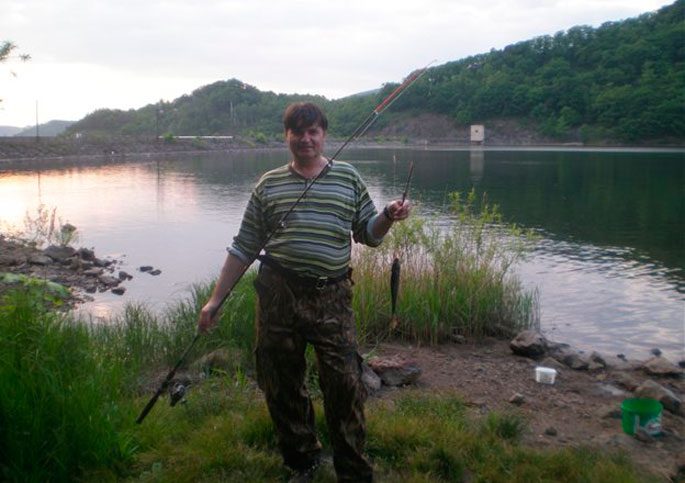
This place is also characterized by the presence of paid services. To enter the territory you will have to pay 150 rubles. After payment, vacationers can receive free garbage bags, as well as recommendations on the availability of fishing spots. Going fishing in these places, you should know that there are practically no normal roads in the territory. Therefore, if the car is not able to move off-road, then it is better not to count on a normal outcome of fishing. Those who have already fished in these places indicate that crucian carp, minnow, carp, catfish and gudgeon bite best here.
Fish bite here in any weather, so no one will be left without a catch. When choosing a place for fishing, you should take into account some of the nuances so as not to go in vain. For example, the Bogataya River is distinguished by the fact that it contains a large number of different types of fish, but fishing from the shore is strictly prohibited here. There are practically no fish left in such rivers as the First and Second, so it makes no sense to go fishing here. There are other nuances that you can learn from local fishermen.
Fishing for flounder. Cape Vyatlin. Fishing in Vladivostok
What can be caught in the waters?
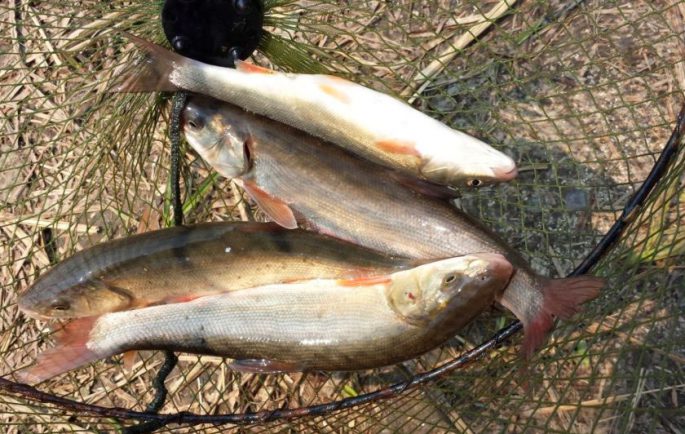
In the immediate vicinity of Vladivostok, there are reservoirs in which a very diverse fish is found.
The most common prey is:
- Burbot, which refers to predatory fish species. He prefers clean and cool water. This predator keeps closer to the bottom and swims to the surface very rarely, even for bait. In this regard, it should be caught on bottom gear. Burbot bites better in winter, before and after spawning. As a rule, this happens in the midst of real cold weather.
- Vaitafe pa'u, which is considered an ubiquitous fish that inhabits almost all water bodies in Europe and Asia. Primorsky Krai is no exception. Perch is found almost everywhere here.
- Alalaga. This fish inhabits rather deep places with underwater thickets. This is the only fish of this family that is found in this region.
- Guster – This is a freshwater fish that can be easily confused with a scavenger. Leads a flock of life, being mainly on the flat areas of reservoirs.
- chub – this is one of the representatives of the carp family and inhabits mainly local rivers. The chub prefers areas with fast currents and clear water.
- Manatu – This is a fish that can be found in almost all reservoirs, since it is completely unpretentious to the environment. It is found in both rivers and lakes.
- Pike – this is the most famous toothy predator, the capture of which every angler dreams of. As you know, this is the only predator of its kind, for which special equipment is required to catch.
- In water bodies where there is enough oxygen, pike perch is also found.. This is a bottom fish that can really be caught on bottom gear or deep-sea bait.
- Roach quite widespread in all water bodies where there is no fast current. It is caught on any kind of bait, both animal and vegetable origin, using a conventional float fishing rod.
- Faapaʻu found in local bays and river tributaries. It is unpretentious to the quality of water, so it is found everywhere in these places. As a rule, tench should be looked for in areas of water areas with a muddy bottom.
- Ieriko refers to a very cautious fish, so it is difficult to catch it, especially for a novice angler.
- Amur paepae is considered a valuable and noble fish in these places.
- Carp or “vertical carp”, as it is also called. It is no secret that this is a fairly strong fish, which requires experience and reliable tackle when catching.
- Ruff also widely distributed in coastal waters. Unfortunately, he is not very interested in local fishermen.
- Tatau – this is the largest representative of freshwater fish species, which is found in many rivers and lakes, including Primorye. He leads a nocturnal lifestyle, and in the daytime he rests, being either at a depth or in hard-to-reach places, with abundant aquatic vegetation.
- Faʻa Crucian and rudd are common in all water bodies. Many anglers love to catch them. As a rule, they are caught on an ordinary float fishing rod.
Fagotaga taumalulu
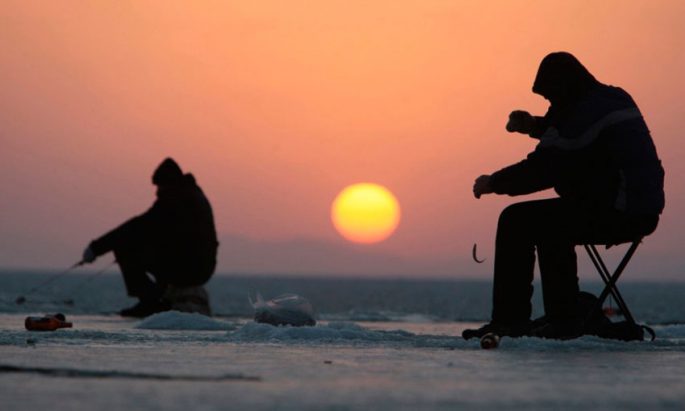
Winter fishing is of great interest to local fishermen. Some go out on the ice to relax, but for many local fishermen it is a way of life. In winter, a variety of fish begin to peck here, which is not possible to catch in summer.
Most of them go to Russian Island, because the prices there are not high. Despite this, some of them prefer wild waters with untouched nature.
Fishing in Primorye is distinguished by some features. For example:
- It is not necessary to go fishing within the Russian Island, since there are wonderful places to the west of Vladivostok, closer to the Amur Bay. In addition, fishing is real within the Ussuri Bay, despite the fact that in winter it is not completely covered with ice. In other words, productive fishing awaits everyone, no matter in which direction they go from Vladivostok.
- In winter, smelt is considered the main prey. Three species of smelt are found here, the largest of which is catfish, reaching a length of 30 cm.
- Fish are caught in the winter with all types of baits, both natural and artificial. The latter show unique possibilities, surpassing even natural ones. At the same time, you do not need to have any special baits, but it is enough to wind multi-colored strings on the hook or put on cambric. In winter, such, sometimes primitive baits, attract fish better than natural ones.
- In winter, it is possible to catch flounder and gobies, and not just smelt. Flounder fishing requires drilling holes of a slightly larger diameter than usual, due to the peculiarities of the shape of this fish. As for the gobies, they are fed to domestic animals, and the inhabitants themselves do not eat them. In winter, you can catch another trophy – saffron cod.
Fish biting forecast in Vladivostok
Biting in these parts, and hence the catch largely depends on the season. Based on these data, it is realistic to make a calendar – a forecast, depending on the season.
Fagotaga i le taumalulu
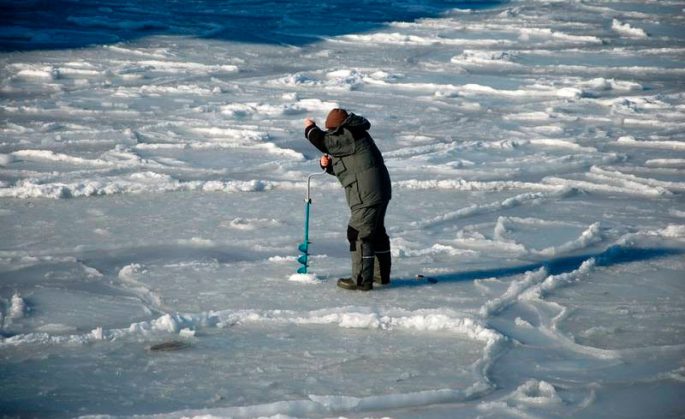
This is the best period for effective fishing in these parts. At the end of autumn, smelt begins to peck, and with the onset of winter, you can count on the capture of saffron cod. During this period, spawning begins at the saffron cod, which is associated with its activity.
During this period, it is at a depth of 10 to 15 meters. As for flounder, it is better to look for it in shallow water. The month of February is characterized by an active biting of the flounder, since after spawning it begins to eat. During this period, she is ready to eat even her own caviar. At the end of winter, it is better to try natural baits, such as a sea worm, although fish are still actively caught with artificial baits, which are rather primitive.
Winter fishing. Vladivostok, 08.12.2013, DR, smelt, mufflers.
Fagotaga tautotogo
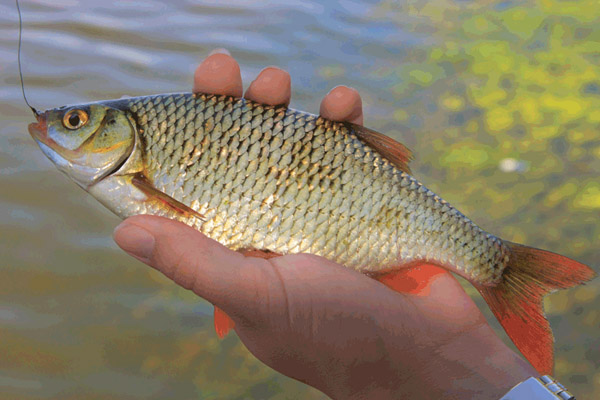
With the advent of spring, the biting of those fish species that were active in winter still continues. After the month of March, herring begins to peck, especially on small baubles. With the approach of heat, and this is the end of March, the beginning of April, the rudd begins to make itself felt.
At the end of April, black flounder swims into local water bodies, as well as walleye pollock, which can also be caught here. In the month of May, the spawned rudd is especially active. She bites mainly on natural baits.
Fagotaga i le tau mafanafana
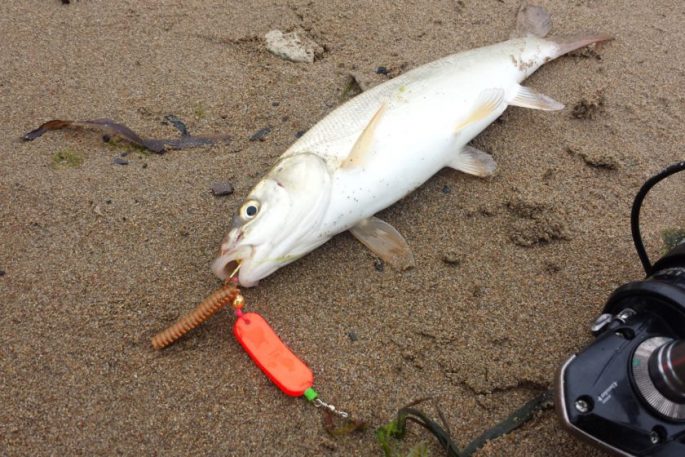
Summer fishing in Primorye is not very popular compared to winter fishing, although it is possible to catch any fish in the reservoirs. In high summer, anchovies and spotted konossiers move here from the south, which are easily confused with herring. At the same time, their number is not large and they rarely appear in the catch.
Exclusively in the summer, mullet swims into the reservoirs of Primorye.
With the advent of August, the water in the reservoirs warms up the most, so all the fish sharply reduce activity. This is due to the fact that the level of oxygen drops greatly and the fish goes to the depth. During this period, it is better to switch to catching fish with other, bottom gear.
Fagota i le tautoulu
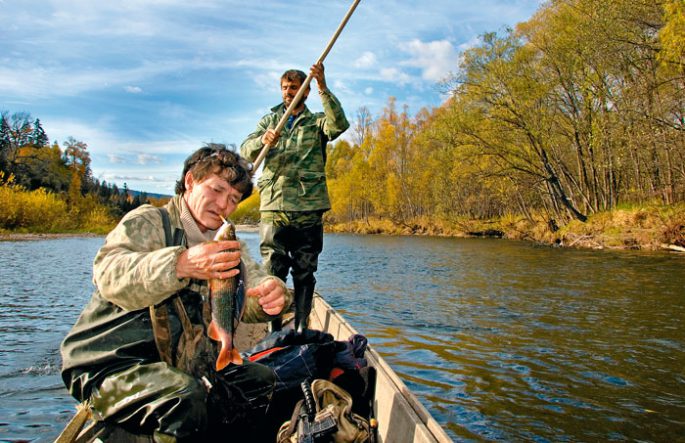
In September there is still no bite, but towards the end of it, when the water is already saturated with oxygen, the fish tries to return to their favorite places. Somewhere until the end of October, rudd, some types of flounder and bison continue to be caught.
By mid-October, in local waters, you can find herring stocked with nutrients and which immediately begins to interest fishermen. The month of November is notable for its unstable biting, since heat-loving species are no longer pecking, and winter species have not yet arrived. This is just a period of calm, when anglers are thoroughly preparing for winter fishing.
Weather conditions in Vladivostok
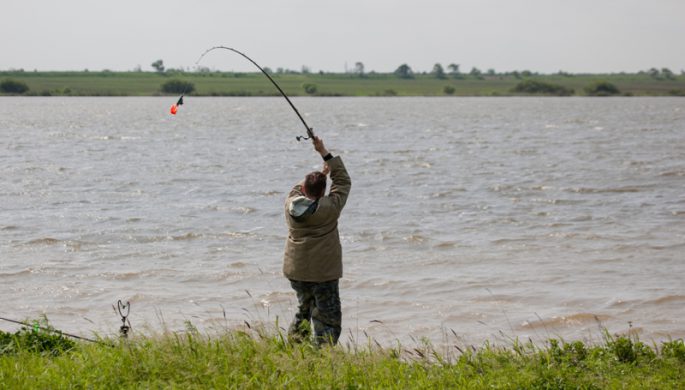
Vladivostok is characterized by some features associated with weather conditions, which must be taken into account when going fishing. For example:
- Winter in this region is characterized by sunny, but very frosty weather. The winter period begins in mid-November and lasts almost until the end of March. Average temperatures are at around -12°C, while strong snowstorms, gusts of wind, and thaws are possible.
- The weather in spring is characterized as unstable, with an average temperature of +5°C. Somewhere in the middle or at the end of May, the air warms up to +10 degrees. In mid-April, the last frosts are observed. The weather in spring in Vladivostok is an alternation of both warm and cold periods.
- Summer in Vladivostok is quite short and it comes late due to heavy fogs. The air in summer can warm up to a maximum of +20 degrees. In summer, the weather is also unstable until August, when stable sunny days can be observed.
- Despite the fact that autumn is also short, it is quite warm, with average temperatures ranging from +10 to +15 degrees. During this period, there is practically no precipitation, and only in the month of November, the first frosts are noted. After autumn, seaside winds begin to dominate.
In conclusion, based on the above, the conclusion suggests itself that fishing in Vladivostok is a real find for avid fishermen. Here are excellent conditions for those who cannot stand the heat of the southern regions, because even in summer it is warm here, but not hot.
Vladivostok is also distinguished by its unique nature, which may be of interest to many tourists and vacationers who have decided to leave the bustle of the city for a while. Almost everyone will be satisfied with their vacation in Primorye.
Everyone will be interested here, and not just fishermen, since Vladivostok has sanatoriums, rest houses, museums and beautiful coastlines. This is a place for those who do not want to spend time fishing, but just want to gain strength and energy.
Sea Fishing 2017 Flounder , Crab , Katran (shark) Vladivostok Nikolay Baryshev









